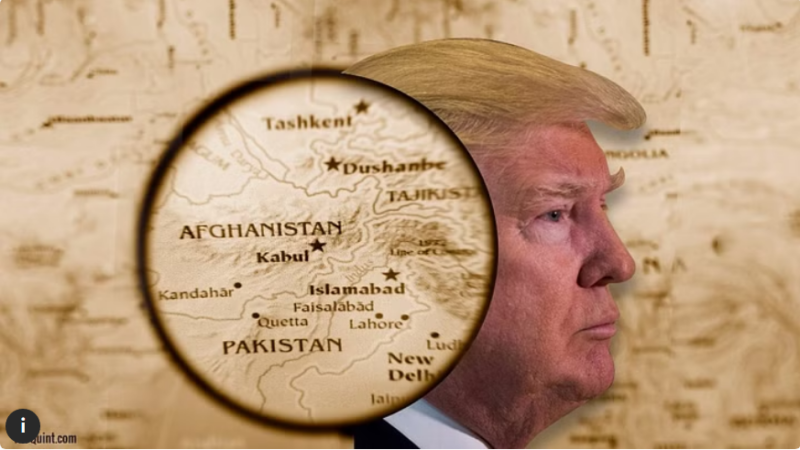US engagement in Afghanistan, in its 16th year now, has been complicated by the involvement of regional powers.
Donald Trump’s so-called Afghanistan strategy suffers from policy incoherence and confusion that has bedeviled America right from the very start. Using force against a country, sustaining that power under the rubric of state-building, and building national institutions including a ‘representative’ government are not simple tasks, especially in the 21st century.
Even more difficult has been to convince an ally such as Pakistan to subsume its strategic ambitions in the plans of the superpower. Pakistan has played along. Pakistan has defied. For it views Afghanistan as an arena where its rivalry with India will play out.
The long shadows of the 1971 war and break up of the country inform Pakistan’s strategic thinking. Right, wrong, exaggerated, or paranoid. This is how it is. And it’s not going to change anytime soon.
We can no longer be silent about Pakistan’s safe havens for terrorist organisations, the Taliban and other groups that pose a threat to the region and beyond… We have been paying Pakistan billions and billions of dollars. At the same time, they are housing the very terrorists that we are fighting.
Thus warned US President Donald Trump after a months-long review of the US war in Afghanistan and deliberations on future US strategy in South Asia.
While Trump acknowledged Pakistan’s losses, the overall tenor of his speech was simply a threat. “Pakistan has much to gain from partnering with our effort in Afghanistan. It has much to lose by continuing to harbor criminals and terrorists,” he said.
Pakistan’s Uneasiness Over Indo-Afghan Ties
American engagement in Afghanistan, now in its 16th year, has been complicated by the involvement of regional powers in the conflict.
Pakistan, the most crucial neighbour of Afghanistan, has direct stakes in peace and stability in Afghanistan. So does Iran, as it hosts a large number of refugees. Prolonged American presence is not the best of solutions that Iran would welcome.
India-Pakistan enmity has largely defined Pakistan’s policy in Afghanistan for the past three decades. Pakistan views growing Indian role in Afghanistan with suspicion. While New Delhi argues it is only interested in the economic development of Afghanistan, Pakistan’s security establishment is convinced that this is much more than economic support.
Trump’s formal invitation to India – even though made with reference to the trade lever – to play an increased role will only heighten Pakistan’s strategic anxieties. Unless some miraculous developments take place, estrangement is writing on the wall.
Pakistan had been slowly preparing for this moment. It’s establishment was convinced that with waning interest in Afghanistan and the region, Pak-US relations would return to the troubled phase of 1990s. Pakistani generals are lucky for the Chinese One Belt One Road includes Pakistan.
Reason Behind Crumbing Pak-US Relations
For the past few years, Pakistan has fully aligned itself with the Chinese economic and strategic plans. This has a good measure of political support as well. Other than the Baloch nationalists and a few voices from Khyber Pakhtunkhwa, the country has readily accepted Chinese investment and future role in the country’s development with desperate, open arms.
Another windfall of this alignment has been the thaw with Russia, and its economic and defence support, which is now likely to increase.
But it is China in the main that is seen as a bailout option in view of crumbling Pakistan-US relations. After Donald Trump’s policy statement, Chinese officials have spoken in favour of Pakistan, highlighting country’s struggle against terrorism.
Yet, any solution to Afghanistan that Washington weighs, cannot escape Pakistan’s direct involvement. India can ‘help’ the US, but only to an extent. This is why Pak-US bilateral discord is not likely to turn into a divorce. Trump’s lack of faith in diplomacy makes it worse for the future months, and even years.
Why Trump’s Afghan Plan is No Strategy
There are several key positions still to be filled up in the State Department. The Afghanistan speech confirmed his over reliance on the national security officials, especially the military commanders. And as we, especially in Pakistan, know rather well, there are serious limits to policy set by the generals.
This is why Trump’s South Asia and Afghanistan plan is not a strategy. It is ambiguous, has no clear definition of what would entail a ‘victory’ and more critically, it is silent on a regional peace process for negotiating an end to conflict in Afghanistan. It is a long-winded way of saying that the US is not leaving Afghanistan.
After burying Obama’s approach as well as his own election promises, President Trump has refused to give any timeline on pulling out. This refusal to be clear, though, strengthens Washington’s position in the short-term.
But it will directly escalate the war in Afghanistan in coming months. In the medium to long-term, peace will continue to elude Afghanistan, as regional actors – Pakistan, Iran and China – will also review their respective policies related to Afghanistan.
Perhaps the worst fallout of this imbroglio will be the heightened India-Pakistan tensions. When the world’s only superpower could have played a constructive role in making the two nuclear-arms-toting nations to talk, it is actually encouraging competition on who can ‘do more’. In other words, this spells more conflict.
It will be a test of Indian and Pakistani leaders to resist this temptation of escalating tension and finding a way to talk about Afghanistan in a statesman-like manner. Seventy-year-old countries can no longer make excuses. But knowing the histories and the domestic political imperatives, this is not likely to happen.
24 August 2017: With Trump’s Empty Afghan Strategy, Up to India & Pak to Play Nice (The Quint)



